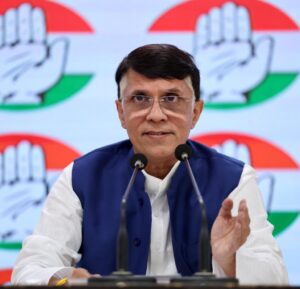Pawan Khera Slams BJP on National Security and Historical Precedents
In a strongly worded statement, AICC Media and Publicity Department Chairman Pawan Khera has criticized the ruling Bharatiya Janata Party (BJP), accusing it of engaging in “petty politics” over matters of national interest. Khera emphasized that the opposition will continue to raise questions related to national security, asserting that silence on such matters would endanger the country further.

Key Highlights from Pawan Khera Slams BJP
🔸 “We will continue to ask questions.”
Khera said that no government should expect the opposition to stay silent when it comes to matters that impact the country’s security. “If we do not ask questions,” he warned, “terror attacks will continue to happen in the country.”
🔸 Historical Allegation Against Former PM Morarji Desai
Khera recalled a controversial historical episode involving former Prime Minister Morarji Desai. He alleged that during Desai’s tenure, he personally informed then Pakistani General Zia-ul-Haq about intelligence gathered by India’s external agency, R&AW, regarding Pakistan’s nuclear activities in Kahuta.
“This intelligence leak resulted in the loss of several R&AW operatives and the undoing of decades of strategic work,” Khera claimed. He further noted that Morarji Desai was later awarded the ‘Nishan-e-Pakistan’, Pakistan’s highest civilian honor — a decision Khera implied was linked to that very act of betrayal.
🔸 Targeting Current Foreign Minister S. Jaishankar
Khera didn’t limit his criticism to the past. He alleged that External Affairs Minister Dr. S. Jaishankar’s recent actions — though not elaborated on in detail — also fall into the category of “sins” that compromise national integrity.
🔸 Ceasefire During Border Escalation
Khera also referenced an incident during a military escalation with Pakistan. “Our brave soldiers had brought Pakistan to its knees,” he said, “but suddenly Donald Trump intervened and called for a ceasefire.” The implication was that such external interference, allegedly accepted by Indian authorities, amounted to a compromise on India’s sovereignty.
“We will not compromise with betrayal”
Concluding his statement with a bold stance, Khera declared: “We will not accept betrayal in the name of diplomacy or politics. We will raise our voices, no matter who is in power or at what position.”
Political Context
The remarks come amid heightened political tensions in India, where issues of national security, foreign policy, and cross-border threats often become central to public discourse. The opposition, especially the Congress Party, has increasingly focused on accountability regarding defense preparedness and diplomatic decisions involving Pakistan and other strategic adversaries.
Why This Matters
Khera’s statement taps into a broader national debate: how should democratic governments balance secrecy in defense with public accountability? And to what extent should political parties question decisions involving military strategy or international mediation?
As India heads toward another cycle of general and state elections, expect national security to remain a key issue — and expect the political rhetoric around it to intensify









